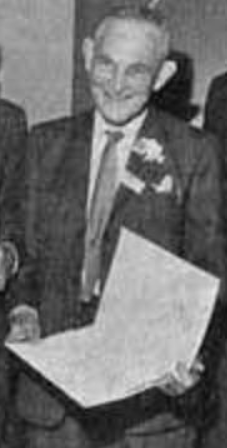Frank Wokes
Frank Wokes (1907–1998) was a notable figure in the field of physics, particularly known for his contributions to the development of radar technology during World War II. His work played a crucial role in advancing the capabilities of the Allied forces. Beyond his wartime contributions, Wokes was also deeply involved in the post-war scientific community, focusing on the peaceful applications of nuclear energy and advocating for scientific research's role in society.
Early Life and Education[edit | edit source]
Frank Wokes was born in 1907 in a small town in England. From a young age, he showed a keen interest in the sciences, which led him to pursue a degree in Physics at a prestigious university. His academic prowess was evident through his innovative research and experiments, which laid the groundwork for his future contributions to science and technology.
Career[edit | edit source]
World War II Contributions[edit | edit source]
During World War II, Wokes was part of a team of scientists tasked with developing radar technology. Radar was crucial for the detection of incoming enemy aircraft and for the navigation of Allied planes. Wokes' work involved improving the sensitivity and reliability of radar systems, which significantly enhanced the Allies' defensive and offensive capabilities. His innovations not only had a profound impact on the outcome of the war but also set the stage for future advancements in radar technology.
Post-War Efforts[edit | edit source]
After the war, Frank Wokes shifted his focus to the peaceful applications of nuclear energy. He was a strong advocate for the use of nuclear power as a means to address the growing energy needs of the post-war world. Wokes was involved in several key projects aimed at harnessing nuclear energy for electricity generation, contributing to the early development of nuclear power plants.
In addition to his work on nuclear energy, Wokes was passionate about the role of science in society. He believed that scientific knowledge should be used to improve the quality of life and was an active participant in discussions and initiatives aimed at promoting science education and research.
Legacy[edit | edit source]
Frank Wokes' contributions to radar technology and nuclear energy have left a lasting impact on the fields of physics and engineering. His work during World War II is credited with saving countless lives and altering the course of the conflict. Furthermore, his post-war efforts helped lay the foundation for the use of nuclear energy as a sustainable power source.
Wokes was also a mentor to many young scientists, inspiring them to pursue careers in research and innovation. His vision for the role of science in society continues to influence discussions on scientific policy and education.
Death[edit | edit source]
Frank Wokes passed away in 1998, leaving behind a legacy of innovation and advocacy for science. His contributions continue to be celebrated in the scientific community, and his work remains a testament to the power of scientific ingenuity in solving complex problems.
Search WikiMD
Ad.Tired of being Overweight? Try W8MD's physician weight loss program.
Semaglutide (Ozempic / Wegovy and Tirzepatide (Mounjaro / Zepbound) available.
Advertise on WikiMD
|
WikiMD's Wellness Encyclopedia |
| Let Food Be Thy Medicine Medicine Thy Food - Hippocrates |
Translate this page: - East Asian
中文,
日本,
한국어,
South Asian
हिन्दी,
தமிழ்,
తెలుగు,
Urdu,
ಕನ್ನಡ,
Southeast Asian
Indonesian,
Vietnamese,
Thai,
မြန်မာဘာသာ,
বাংলা
European
español,
Deutsch,
français,
Greek,
português do Brasil,
polski,
română,
русский,
Nederlands,
norsk,
svenska,
suomi,
Italian
Middle Eastern & African
عربى,
Turkish,
Persian,
Hebrew,
Afrikaans,
isiZulu,
Kiswahili,
Other
Bulgarian,
Hungarian,
Czech,
Swedish,
മലയാളം,
मराठी,
ਪੰਜਾਬੀ,
ગુજરાતી,
Portuguese,
Ukrainian
Medical Disclaimer: WikiMD is not a substitute for professional medical advice. The information on WikiMD is provided as an information resource only, may be incorrect, outdated or misleading, and is not to be used or relied on for any diagnostic or treatment purposes. Please consult your health care provider before making any healthcare decisions or for guidance about a specific medical condition. WikiMD expressly disclaims responsibility, and shall have no liability, for any damages, loss, injury, or liability whatsoever suffered as a result of your reliance on the information contained in this site. By visiting this site you agree to the foregoing terms and conditions, which may from time to time be changed or supplemented by WikiMD. If you do not agree to the foregoing terms and conditions, you should not enter or use this site. See full disclaimer.
Credits:Most images are courtesy of Wikimedia commons, and templates, categories Wikipedia, licensed under CC BY SA or similar.
Contributors: Prab R. Tumpati, MD

